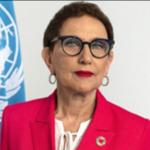The form, speed and geographical scope of globalization have changed, accelerated and expanded tremendously over time, driven by continuous advances in technology and the policy choices of governments and decisions by businesses and individuals. Many developing countries have benefited greatly from economic integration in the past three decades and the global poverty rate has declined markedly. However, there is also recognition that economic integration has outpaced efforts to cushion its negative effects.
The Economic and Social Council and the ECOSOC system has regularly drawn the attention of Member States to the distributional effects of unregulated economic globalization, both within and between countries, as well as the environmental impacts.
The 2030 Agenda for Sustainable Development is at the heart of the current global framework to make globalization more equitable, inclusive and sustainable. Through the 2030 Agenda, its SDGs and other globally agreed policy frameworks, the United Nations provides opportunities for achieving a fair and inclusive globalization, the realization of which requires national and global policy actions.
Proposed guiding questions:
- What are the likely impacts of the current trends in globalization on the achievement of the Sustainable Development Goals?
- How can the Economic and Social Council rise to the challenge of strengthening a rules-based, fair, equitable and pro-sustainable development globalization and international cooperation that works for all?
- What renewal is needed for the Council and the ECOSOC system to address the current challenges related to globalization and multilateralism and look beyond, towards the future, as the United Nations celebrates its 80th Anniversary?
Chair:
- H.E. Mr. Bob Rae, President of ECOSOC
Moderator:
- H.E. Ms. Elizabeth Cousens, United Nations Foundation President and Chief Executive Officer
Panellists:
- H.E. Mr. Suman Bery, Vice Chair, National Institution for Transforming India (NITI Aayog), Government of India
- H.E. Ms. Yuriko Koike, Governor of Tokyo, Tokyo Metropolitan Government
- H.E. Ms. Rosemarie G. Edillon, Undersecretary, Department of Economy, Planning and Development, Philippines
Respondents:
- Ms. Rebeca Grynspan, Secretary-General, United Nations Trade and Development (UNCTAD)
- Mr. Mahmoud Mohieldin, Special Envoy on Financing the 2030 Agenda (virtual)
- Mr. Amar Bhattacharya, Senior Fellow, Center for Sustainable Development, Global Economy and Development Program, Brookings
Interactive discussion:
Due to limited time and to maximise participation, interventions in interactive discussions should be limited to two to three minutes. The time limit will be strictly implemented, using a timing device and/or microphone cutoff as necessary. Depending on the number of requests for the floor in a given discussion, the time limit may be adjusted downward, as necessary. Participants are discouraged from reading prepared statements; instead, they are encouraged to make informal remarks and engage in an interactive discussion. Priority will be given to ministerial-level interventions.
Adoption of the Ministerial Declaration will directly follow the policy dialogue
 Welcome to the United Nations
Welcome to the United Nations









